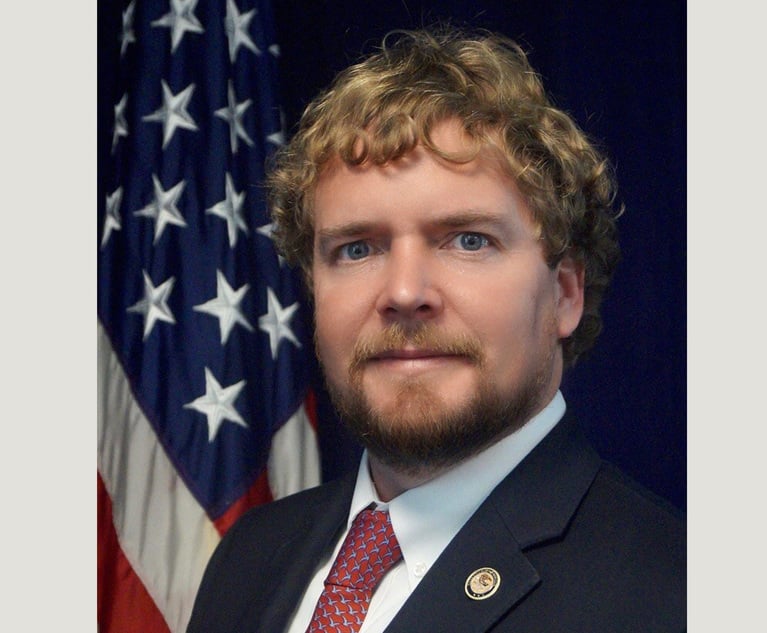McIver Defense Introduces Sleep Disorder Evidence
Tex McIver's diagnoses came 16 months after he shot his wife, Diane.
April 11, 2018 at 02:39 PM
6 minute read

A neurologist and research director of Emory University's sleep medicine program testified Wednesday that he diagnosed Atlanta attorney Claud “Tex” McIver with a sleep disorder that can cause people to act out their dreams.
Dr. David Rye said he diagnosed McIver as suffering from rapid eye movement (REM) sleep behavioral disorder after a January 2018 study—16 months after McIver fatally shot his wife. McIver and his lawyers have always claimed the Sept. 16, 2016, shooting was an accident.
But Rye also suggested that particular disorder is not a likely explanation for McIver shooting his wife, Diane.
Rye also described a second syndrome—confusional arousal, also known as sleep drunkenness—that he said was “one possible explanation.”
Rye's 2018 diagnosis was intended to bolster the defense narrative that McIver was asleep in the back of the couple's Ford Expedition as it drove through downtown Atlanta when the gun he was holding fired. Witnesses have testified McIver offered multiple versions of why he was holding the gun and what caused it to fire, including that he just didn't remember.
But Dani Jo Carter, the family friend who was driving the McIvers' SUV when McIver fatally shot his wife, has testified that she and Diane McIver thought her husband was asleep when they left the interstate to avoid a traffic tie-up. He woke and asked for his gun, then apparently dozed off a second time.
Rye testified that McIver underwent an earlier sleep study at the Mayo Clinic in Jacksonville, Florida, in 2004.
Rye described REM sleep behavioral disorder as a condition where people “will act out their dreams.”
Those dreams “are usually emotionally laden,” Rye said. “Oftentimes there is some emotion that you are being chased, or there is some danger.” People with this disorder “don't arouse quickly,” he said. “They usually have amnesia.”
People suffering from the disorder can injure bed partners or themselves, Rye said.
“We have bed partners that have gotten black eyes, broken bones,” he said. “We have had patients that have broken bones from falling out of bed or hitting bedrails.”
Rye said confusional arousal occurs as a person wakes from sleep. He said it often occurs where there was a “high pressure to deep sleep” and can be brought on by sleep deprivation and augmented by stress.
Rye also said there was nothing that would have prevented McIver from falling asleep, even after he had perceived a danger and asked for his gun. McIver's account that he was startled awake about the time the gun fired is consistent with confusional arousal.
Rye also acknowledged, when questioned by Assistant District Attorney Adam Abbate, that confusional arousal is generally preceded by deep sleep. Rye also acknowledged that January 2018 was the first time McIver was diagnosed with confusional arousal.
Abbate also questioned defense attorney Amanda Clark Palmer's suggestion that McIver might have shot his wife while in the throes of confusional arousal. During a 30-45 minute ride from a Conyers steakhouse to downtown Atlanta, McIver was supposedly sleeping and woke up as the car exited the interstate.
“What he told you, he woke up, immediately recognized the area he was in, immediately recognized the area wasn't safe,” Abbate said to Rye. “He wasn't suffering from sleep drunkenness. … When he wakes up the second time, he is alert, he knows the bullet has been discharged.”
Again, Abbate suggested the hallmarks of confusional arousal didn't appear to be present.
“People perform cognitively at different levels when they wake up,” Rye replied. “I don't know how that translates into this specific event. I wasn't there.”
“I don't think I would classify it as a confusional arousal,” he added. “But you could classify it as your brain isn't functioning 100 percent, possibly.”
Two Charges Dropped
Also Wednesday, Fulton County Superior Court Judge Robert McBurney dismissed two of three felony charges for allegedly influencing witnesses after police opened an investigation into his wife's shooting.
But Fulton County Superior Court Judge Robert McBurney did not dismiss a third charge that McIver allegedly tried to influence Carter's testimony.
On Tuesday, McBurney denied a defense motion to dismiss malice murder and felony murder charges.
Carter has testified that, while medical personnel were attempting to save his wife's life at Emory University Hospital, Tex McIver told her she should tell police she was at the hospital as a family friend.
“It would not be irrational for a jury to think Mr. McIver was attempting to mislead Ms. Carter into thinking it was OK to lie to police,” McBurney said. “She said, 'I didn't find it was OK. I didn't lie to police. But that doesn't mean he didn't attempt.'”
But allegedly misleading police wasn't a factor in charges that McIver attempted to influence witness Bill Crane, who acted as McIver's first spokesman in the days following Diane McIver's death. It also was not the basis of a charge that McIver attempted to influence Carter's husband, Tom Carter, when he left a voicemail saying that Dani Jo Carter was “going to send me to prison.”
Crane testified that McIver repeatedly urged him to retract statements he made to the media claiming McIver was holding a gun because he feared Black Lives Matter protesters.
“I roundly reject the notion that the defendant who attempted to mislead … in an effort to get that person to withhold information from the media is a crime,” McBurney said. “That's not how the statute works.”
McBurney also said he did not find that McIver tried to influence Tom Carter.
“What Mr. McIver was trying to do with his voicemail … was really an effort to influence Ms. Carter, not her husband,” he said.
This content has been archived. It is available through our partners, LexisNexis® and Bloomberg Law.
To view this content, please continue to their sites.
Not a Lexis Subscriber?
Subscribe Now
Not a Bloomberg Law Subscriber?
Subscribe Now
NOT FOR REPRINT
© 2025 ALM Global, LLC, All Rights Reserved. Request academic re-use from www.copyright.com. All other uses, submit a request to [email protected]. For more information visit Asset & Logo Licensing.
You Might Like
View All
'Didn't Notice Patient Wasn't Breathing': $13.7M Verdict Against Anesthesiologists
12 minute read

Trending Stories
- 1John Deere Annual Meeting Offers Peek Into DEI Strife That Looms for Companies Nationwide
- 2Why Associates in This Growing Legal Market Are Leaving Their Firms
- 3Visa's Defense of DOJ Antitrust Case Suffers Setback After Court Denies Motion to Dismiss
- 4Greenberg Traurig Combines Digital Infrastructure and Real Estate Groups, Anticipating Uptick in Demand
- 5Trump Administration Faces Legal Challenge Over EO Impacting Federal Workers
Who Got The Work
J. Brugh Lower of Gibbons has entered an appearance for industrial equipment supplier Devco Corporation in a pending trademark infringement lawsuit. The suit, accusing the defendant of selling knock-off Graco products, was filed Dec. 18 in New Jersey District Court by Rivkin Radler on behalf of Graco Inc. and Graco Minnesota. The case, assigned to U.S. District Judge Zahid N. Quraishi, is 3:24-cv-11294, Graco Inc. et al v. Devco Corporation.
Who Got The Work
Rebecca Maller-Stein and Kent A. Yalowitz of Arnold & Porter Kaye Scholer have entered their appearances for Hanaco Venture Capital and its executives, Lior Prosor and David Frankel, in a pending securities lawsuit. The action, filed on Dec. 24 in New York Southern District Court by Zell, Aron & Co. on behalf of Goldeneye Advisors, accuses the defendants of negligently and fraudulently managing the plaintiff's $1 million investment. The case, assigned to U.S. District Judge Vernon S. Broderick, is 1:24-cv-09918, Goldeneye Advisors, LLC v. Hanaco Venture Capital, Ltd. et al.
Who Got The Work
Attorneys from A&O Shearman has stepped in as defense counsel for Toronto-Dominion Bank and other defendants in a pending securities class action. The suit, filed Dec. 11 in New York Southern District Court by Bleichmar Fonti & Auld, accuses the defendants of concealing the bank's 'pervasive' deficiencies in regards to its compliance with the Bank Secrecy Act and the quality of its anti-money laundering controls. The case, assigned to U.S. District Judge Arun Subramanian, is 1:24-cv-09445, Gonzalez v. The Toronto-Dominion Bank et al.
Who Got The Work
Crown Castle International, a Pennsylvania company providing shared communications infrastructure, has turned to Luke D. Wolf of Gordon Rees Scully Mansukhani to fend off a pending breach-of-contract lawsuit. The court action, filed Nov. 25 in Michigan Eastern District Court by Hooper Hathaway PC on behalf of The Town Residences LLC, accuses Crown Castle of failing to transfer approximately $30,000 in utility payments from T-Mobile in breach of a roof-top lease and assignment agreement. The case, assigned to U.S. District Judge Susan K. Declercq, is 2:24-cv-13131, The Town Residences LLC v. T-Mobile US, Inc. et al.
Who Got The Work
Wilfred P. Coronato and Daniel M. Schwartz of McCarter & English have stepped in as defense counsel to Electrolux Home Products Inc. in a pending product liability lawsuit. The court action, filed Nov. 26 in New York Eastern District Court by Poulos Lopiccolo PC and Nagel Rice LLP on behalf of David Stern, alleges that the defendant's refrigerators’ drawers and shelving repeatedly break and fall apart within months after purchase. The case, assigned to U.S. District Judge Joan M. Azrack, is 2:24-cv-08204, Stern v. Electrolux Home Products, Inc.
Featured Firms
Law Offices of Gary Martin Hays & Associates, P.C.
(470) 294-1674
Law Offices of Mark E. Salomone
(857) 444-6468
Smith & Hassler
(713) 739-1250







